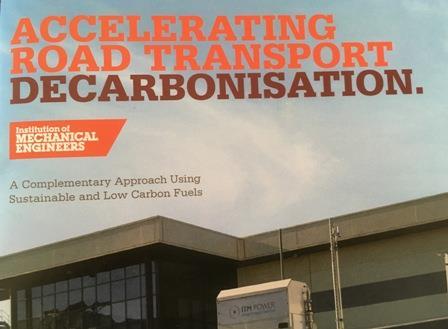
Decarbonising UK road transport at the rate required to achieve the government’s net-zero carbon emissions target by 2050 will require much greater emphasis on developing renewable bio and synthetic fuels for use in conventional internal combustion engines (ICE), according to the influential Institute of Mechanical Engineers (IMechE).
In a new report, ‘Accelerating road transport decarbonisation’ the IMechE argues that while the development of battery electric vehicles (BEVs)will be important in the long term, this technology cannot replace ICE engines quickly enough.
“We cannot rely on electric vehicles to make any meaningful impact on reducing greenhouse gas emissions fast enough and the ICE is likely to be with us for the foreseeable future,” said IMechE chief engineer Jenifer Baxter. This is especially true of HGVs, described as the “most stubborn” category when it comes to moving away from ICEs.
The report was co-authored by Paul Jones, chair of the IMechE’s automobile division, and Steve Sapsford, chair of the IMechE powertrain systems and fuels group and now MD of US renewable electricity utility SCE. Sapsford, who worked for engineering consultancy Ricardo for 32 years, said the government should put as much money into the development of clean synthetic and second generation biofuels made from waste as it is investing in BEVs.
“We’re calling for more research into improving the efficiency and emissions reductions of ICEs, renewable and low carbon fuels,” he said. “The current focus on tank to wheel emissions also ignores well to wheel emissions and the carbon emitted in the production and recycling of vehicles. Recycling lithium ion batteries is really hard involving complex processes and some nasty solvents.
“It is a massive missed opportunity to just measure emissions at the tailpipe. Doing more with biofuels buys us time and is the only solution for heavy duty vehicles.”
The IMechE report is focused on cutting carbon emissions rather than local pollutants like NOx and particulates and Sapsford pointed out that these latter emissions are at the same very low levels for Euro-6 diesel engines running on fossil fuels and biofuels.
The report includes hydrogen as a potential future low carbon fuel but only when it can be made using renewable electricity as most hydrogen is currently made from fossil fuels such as methane and coal.













